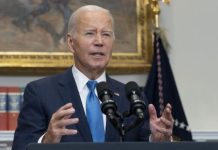SALT LAKE CITY, Utah, April 14, 2020 (Gephardt Daily) — The Utah State Legislature announced it will convene a special session beginning Thursday to address issues related to COVID-19.
A news release from the Utah Legislature said it was decided to exercise the Legislature’s emergency powers to convene the virtual special session in order to re-examine the state budget and address issues to meet state needs arising from the coronavirus outbreak.
“COVID-19 is impacting education, healthcare systems, the economy, Utah’s business community, individuals and families throughout the state in unprecedented ways. In light of these circumstances, on April 16, the Legislature will convene in its first-ever virtual session,” the news release said.
Issues to be addressed in this special session, which could continue for up to 10 days, will include:
- Formally accepting federal emergency funding
- Extending the deadline for submitting state sales taxes to July 15, 2020
- Ensuring access to medication
- Preparing for the June primary election
“State leaders are committed to careful planning and working diligently to keep Utahns healthy and safe while keeping our economy going,” the news release said.
Senate President J. Stuart Adams said in the release, “We are working together to achieve the most favorable outcomes in our state’s fight against the virus, protecting Utah’s families as well as Utah’s businesses.
“Utah is nationally recognized as one of the states best-prepared to handle unexpected situations. As a state, we don’t just sit back and wait. We always look for options on how to conquer problems. Our private and public sectors have joined forces to win this battle together. As we navigate these unprecedented times, we are committed to finding innovative solutions to do what is in the best interest of all Utahns. Together, we will get through this.”
Virtual committee meetings will not be ready for this remote session.
“Proposed legislation will be made publicly available online in advance,” the news release said. “Utahns are encouraged to participate by submitting inquiries and feedback directly to their legislators on the Senate and House websites. Citizens can also comment on specific legislation at le.utah.gov. Floor proceedings will be streamed on the legislative website and broadcast on television on KUEN channel 9.”
The legislation to be considered, as stated in a proclamation, includes:
1. authorizing the state to accept certain federal funds available from the United
States government to assist states, political subdivisions, and individuals in
addressing issues raised by the COVID-19 emergency and issues raised by steps
taken to abate the emergency;
2. adjusting the fiscal year 2020 and fiscal year 2021 budgets to address the COVID-
19 emergency and its impacts;
3. increasing the state’s capacity to issue general obligation bonds by removing
statutory limits on current debt authorizations;
4. making changes to budget implementation and budget reporting requirements;
5. making changes to the state’s unemployment insurance program to reduce the
waiting period before benefits can be distributed to an applicant under certain
circumstances;
6. making changes to the state’s workers’compensation insurance program to cover
first responders who contract COVID-19 under certain conditions;
7. making changes to income tax provisions relating to qualified retirement plan
distributions, filing and payment deadlines, and extension requirements;
8. establishing protocols, requirements, and processes to guide the state toward
economic recovery from the impacts of the COVID-19 emergency;
9. providing assistance to certain Utah businesses and residents negatively affected
by the COVID-19 emergency;
10. making changes to requirements governing statewide emergencies, including
pandemic emergencies;
11. making changes to requirements governing local government authority in
emergencies, including pandemic emergencies;
12. establishing, or encouraging the establishment of, protocols, requirements, and
processes to make it easier for patients to obtain safe medications that could
positively affect outcomes for patients diagnosed with the COVID-19 virus;
13. establishing liability protection for certain entities that provide or support access
to emergency medical treatments to address the COVID-19 virus and, with certain
exceptions, establishing liability protection for health care providers who provide
health care to a patient for an illness or condition that resulted from a declared
public health emergency;
14. establishing processes to govern the 2020 regular primary election;
15. making changes to municipal annexation requirements;
16. making changes to the sales and use tax exemption for sales of fuel to a rail carrier
for use in a locomotive engine and enacting related provisions;
17. creating a program to provide scholarships for students with disabilities to help
cover certain costs to attend qualifying private schools, and creating related
corporate and individual tax credits for certain donations to the scholarship
program;
18. a resolution urging state and local government entities to exercise fiscal
responsibility with the remainder of their 2020 budgets and to continue to limit spending in fiscal year 2021 because of the economic impact of the COVID-19
emergency;
19. waiving the requirement for local education agencies to administer year-end
statewide and other assessments for the 2019-20 school year; addressing statutory
requirements impacted by the suspension of year-end assessments in the 2019-20
school year; granting a waiver from the requirement to pass a civics test as a
condition for graduation if the student is a senior and meets certain conditions;
and addressing the requirement that local education agencies perform educator
evaluations for the 2019-20 school year;
20. a resolution expressing solidarity with the Chinese people regarding the COVID-19
virus; and
21. establishing liability protection for individuals and entities related to exposure to
contagious diseases.






